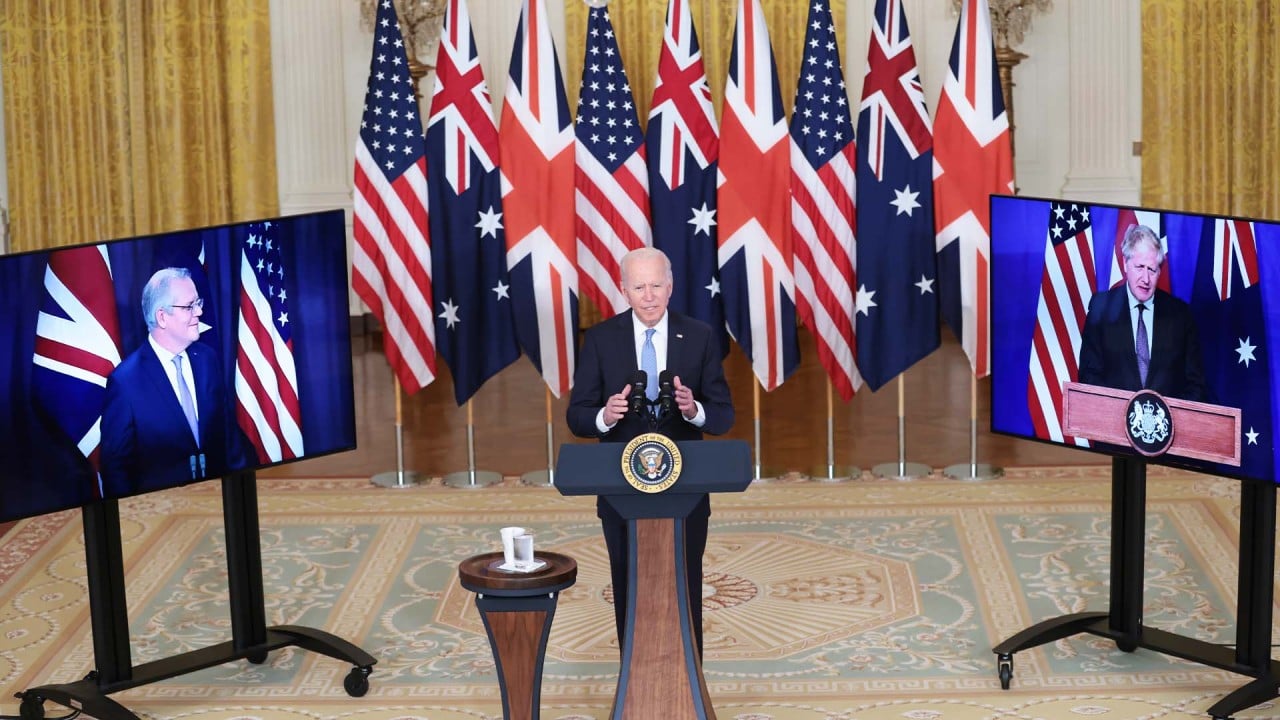
China appeals for global unity in wake of US-led Aukus security alliance
- Xi Jinping tells SCO summit that international issues can’t be solved by bullying
- Agreement will trigger an arms race, Chinese envoy to UN in Vienna says
In a virtual address to a regional security summit in Dushanbe on Friday, Xi said international issues could not be solved by bullying from “a position of strength”.
Without referring to the United States, Xi used the same phase that top Chinese diplomat Yang Jiechi used to attack the US at a high-level meeting in Alaska in March.

03:51
US, UK, Australia announce ‘historic’ military partnership in Pacific
The call came a day after the US, Britain and Australia launched Aukus, a security alliance allowing the parties to share nuclear-powered submarine technology.
Aukus is seen as an effort to boost security deterrence against China in the Asia-Pacific, and China responded by saying it would trigger an arms race.
France also took aim at the alliance, which upended its submarine deal with Australia.
“It’s really a stab in the back. We had established a relationship of trust with Australia, this trust has been betrayed,” French Foreign Minister Jean-Yves Le Drian said on Thursday.
“I’m very angry today, and bitter ... This is not something allies do to each other.”
US allies’ move on nuclear submarines for Australia a boost to region’s hard power, analysts say
Wang Qun, China’s envoy to the United Nations in Vienna, called on the international community to oppose the alliance, saying it was a “sheer act of nuclear proliferation”.
Addressing an International Atomic Energy Agency board of governors meeting on Thursday, Wang urged the UN nuclear watchdog to oppose the alliance.
Officials of the three nations have stressed that the agreement will not mean Australia will have nuclear weapons but Wang said the alliance would “apparently give rise to proliferation of nuclear materials and technologies”.
“The US and Britain ... will openly provide assistance to Australia, as a non-nuclear weapon state, in its acquisition and construction of nuclear-powered submarines,” Wang said.
“This contradicts the purpose, objective and core obligation of the [Non-Proliferation Treaty] to the detriment of the international nuclear non-proliferation regime.”
Wang also said the IAEA had the responsibility to “openly express its solemn position at the trilateral act by the US, Britain and Australia”.
Nuclear submarines give Australian military an edge and could deter China further
The IAEA monitors use of nuclear energy and works to prevent the technology from being used for military purposes. It plays a key role in compliance, including that of the 1968 treaty.
Only five nuclear weapons states are recognised by the NPT – the United States, Russia, China, France and Britain.
“Such an act of nuclear proliferation will give rise to serious negative implications for the ongoing international efforts to address the nuclear issue on the Korean peninsula and the Iranian nuclear issue,” he said.
“In the meantime, China calls on the international community to work together to check such a dangerous act.”
Separately, the IAEA said on Thursday that Australia, Britain and the United States had informed the agency of their new partnership and both sides planned to “engage” over the coming months.
“The three countries have informed the IAEA at an early stage on this development. The IAEA will engage with them on this matter in line with its statutory mandate, and in accordance with their respective safeguards agreements with the agency,” it said.

